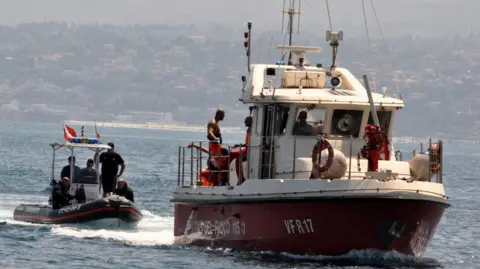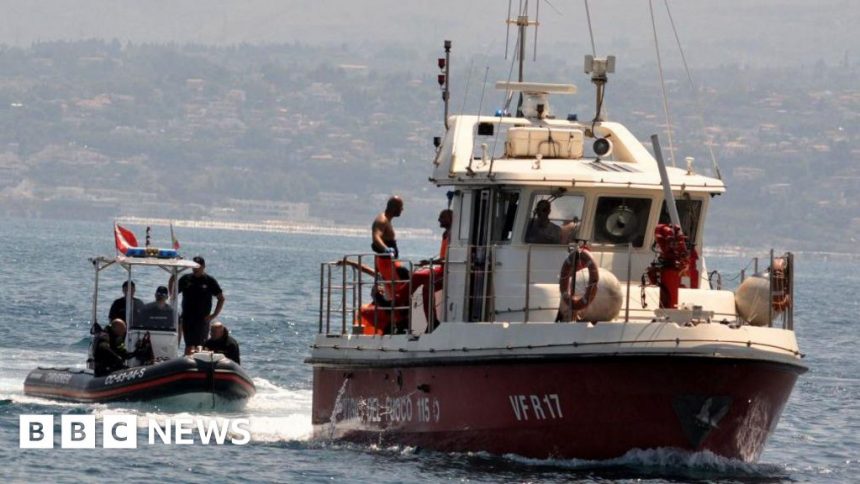Three crew investigated over Bayesian yacht sinking
 Alessandro FUCARINI/AFP
Alessandro FUCARINI/AFPItalian authorities are expanding their investigation into the deaths of seven people on the yacht, the Bayesian, to include two crew members as well as the captain, according to Italian news agencies.
British tech entrepreneur Mike Lynch and six others lost their lives when the 56m (184ft) yacht, flying a British flag, sank off the coast of northern Sicily on 19 August.
The investigation is now said to include ship engineer Tim Parker Eaton and sailor Matthew Griffith.
Being investigated does not equate to being charged and is a procedural step.
The boat went down within minutes during a pre-dawn storm while the yacht was anchored off the northern coast of Sicily.
On Monday, the yacht’s 51-year-old captain, New Zealand national James Cutfield, was reportedly placed under investigation for manslaughter and causing the shipwreck.
During questioning on Tuesday, he declined to answer the prosecutors’ inquiries.
Speaking to reporters afterwards, one of the captain’s lawyers, Giovanni Rizzuti, said: “The captain exercised his right to remain silent for two fundamental reasons. First, he’s very worn out. Second, we were appointed only on Monday and for a thorough and correct defence case, we need to acquire a set of data that at the moment, we don’t have.”
 PA Media
PA MediaTim Parker Eaton is understood to have been in charge of adequately securing the yacht’s engine room and operational systems, while Matthew Griffith was on watch duty during the night of the disaster.
The sinking has left naval experts baffled, as they believe a yacht of Bayesian’s calibre, constructed by the prestigious Italian yacht builder Perini, should have been able to withstand the storm and certainly should not have sunk as rapidly as it did.
 Vincenzo Pepe/Getty Images
Vincenzo Pepe/Getty ImagesProsecutors based in Termini Imerese, near Palermo, have indicated that their investigation will be lengthy and will require the salvage of the wreckage.
The head of the company that built the Bayesian, Giovanni Costantino, told the BBC he was convinced there had been a litany of errors on board.
“At the back of the boat, a hatch must have been left open,” he said, “but also perhaps a side entrance for water to have poured inside.
“Before the storm, the captain should have closed every opening, lifted anchor, turned on the engine, pointed into the wind and lowered the keel.”
The keel is a large, fin-like part of the boat that protrudes from its base.
“That would have stabilised the vessel, they would have been able to traverse the storm and continue their cruise in comfort,” he said.
Currently, the Bayesian rests on its right side at a depth of approximately 50m (164ft).
Meanwhile, the Italian Coast Guard has been conducting environmental monitoring activities at the site of the sinking, to prevent possible hydrocarbon spills from the hull.
At the moment, the are no leaks from the tanks and no traces of oil pollution, the Coast Guard said in a statement on Wednesday.






